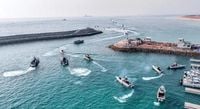President Donald Trump is reportedly planning to rename the Persian Gulf to the Arabian Gulf before his upcoming trip to Saudi Arabia next week. This controversial move has drawn attention as it reflects ongoing tensions between the U.S. and Iran, as well as the long-standing debate over the naming of this significant body of water.
Two unnamed U.S. officials disclosed Trump's intentions to CNN on May 7, 2025, just days before he embarks on a diplomatic mission to the Middle East, which will include visits to Saudi Arabia, Qatar, and the United Arab Emirates (UAE). The name change has been a point of contention for years, with Arab nations advocating for an alternative to the historically favored term by Iran. While "Arabian Gulf" is commonly used in several Middle Eastern countries, the term "Persian Gulf" has been prevalent since the 16th century.
During a press event in the Oval Office, Trump acknowledged the plan and stated, "I will have to make a decision" regarding the name change during his Middle East trip. He added that Arab leaders would likely raise the issue when he meets with them. Despite the potential for backlash, Trump expressed uncertainty about who might be offended, saying, "I don't want to hurt anyone, but I'm not sure if anyone will feel hurt or not." This statement highlights the delicate nature of the issue.
Iranian officials have reacted strongly to the proposed name change. On the same day that Trump spoke, Iranian Foreign Minister Abbas Araghchi warned that altering the traditional name would incite outrage among all Iranians, regardless of their political beliefs. He emphasized the historical significance of the name Persian Gulf, stating, "I believe President Trump knows that the name Persian Gulf has existed for centuries. International organizations and mapmakers have recognized this name. Even regional leaders have used the term Persian Gulf in official documents until the 1960s." Araghchi's remarks were made on social media platform X, where he condemned what he called "politically motivated efforts to change the historically established name of the Persian Gulf."
Trump's administration has previously demonstrated a willingness to alter geographical names for political purposes. Earlier this year, he signed an executive order to rename the Gulf of Mexico to the Gulf of America, a move that has already been reflected on Google Maps for users in the U.S. This sets a precedent for Trump's approach to international nomenclature, raising questions about the implications of such changes.
The Persian Gulf, located off the southern coast of Iran, has been a critical area for geopolitical and economic interests, particularly concerning oil and trade routes. The region is also a focal point for U.S. military presence and strategic partnerships with Gulf states, which are vital allies in countering Iranian influence.
As Trump prepares for his trip, his administration is looking to engage Gulf nations not only for financial investments in the U.S. but also for support in addressing regional instability. This includes efforts to mediate conflicts such as the ongoing Israel-Hamas situation in Gaza and to curb Iran's advancing nuclear program.
The potential renaming of the Persian Gulf to the Arabian Gulf is not just a matter of terminology; it symbolizes deeper political dynamics and the historical narratives that accompany them. For many in Iran, the name is a point of national pride and identity, representing their historical claim to the region.
As discussions about the name change continue, it remains uncertain when Trump will officially announce his decision. The reactions from both Arab nations and Iran suggest that this issue will likely remain contentious, regardless of the outcome.
In summary, Trump's plan to rename the Persian Gulf to the Arabian Gulf is a reflection of his administration's broader strategy to strengthen ties with Gulf nations while navigating the complex geopolitical landscape of the Middle East. The implications of this name change extend beyond mere semantics, touching on national identity, historical claims, and the ongoing tensions between Iran and the U.S.
The upcoming trip will serve as a critical moment for Trump to address these issues head-on, and how he chooses to navigate the naming controversy could impact U.S.-Iran relations and the broader dynamics in the region.




